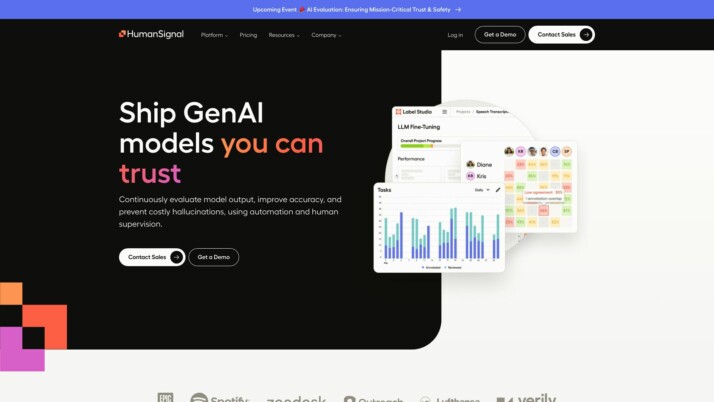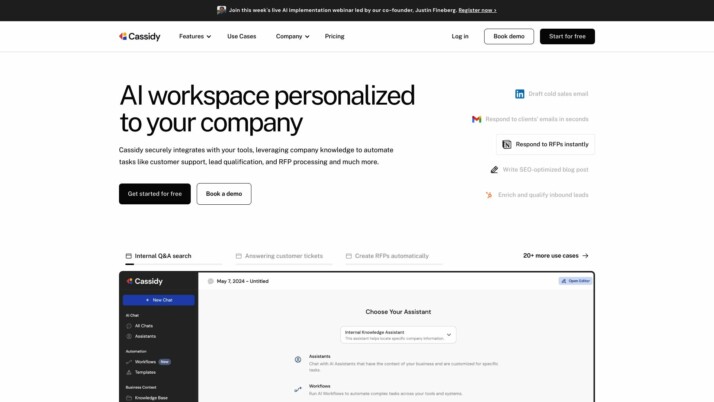Adala vs. Cassidy: Key Feature Comparison Guide
In the rapidly evolving world of artificial intelligence, organizations are seeking innovative solutions to harness the power of this transformative technology. This comprehensive comparison examines the key features and capabilities of Adala vs. Cassidy, and SmythOS, three distinct platforms designed to streamline the creation and deployment of AI agents.
By exploring their unique strengths and specializations, we aim to empower readers with the insights necessary to make informed decisions aligned with their specific requirements and objectives.
Adala Overview
Adala is an intriguing open-source framework designed to create autonomous data labeling agents. These agents leverage large language models like GPT-3 to acquire specialized skills such as text classification, summarization, and question answering.
One of Adala’s standout features is its modular architecture, allowing for the development of extensible skills tailored to specific labeling tasks. The agents undergo a continuous learning process, refining their capabilities through interactions with data and human feedback.


As an open-source initiative, Adala encourages community contributions to its various components, including skills, runtimes, datasets, and environments. The framework’s overarching goal is to increase the efficiency and reduce the costs associated with data labeling tasks while maintaining high quality through human guidance.
Cassidy Overview
Cassidy is a commercial AI platform designed to help businesses create customized AI automations and assistants tailored to their specific needs. The platform allows users to build AI workflows and chatbots that seamlessly integrate with existing tools and data sources, enabling enhanced productivity through context-aware AI solutions.
One of the standout features of Cassidy is its model-agnostic approach, which allows users to utilize any foundational AI model, ensuring their AI strategies are future-proof. The platform offers a user-friendly, no-code workflow builder with a drag-and-drop interface, making it accessible to users without extensive technical expertise.


Cassidy’s AI assistants can handle a wide range of tasks, from responding to emails and processing RFPs to conducting market research. The platform’s ability to integrate with various data sources, including Google Drive, Slack, and Notion, allows these AI solutions to leverage company-specific knowledge and context.
With a strong focus on enterprise-grade security, Cassidy ensures data confidentiality by never using customer data for model training. The platform also offers browser extensions that bring AI capabilities directly into web applications like LinkedIn and email clients, enhancing productivity on the go.
Feature Comparison
While Adala and Cassidy both offer capabilities for building AI agents, they differ significantly in their feature sets and intended use cases.
Adala is an open-source framework designed specifically for creating autonomous data labeling agents. Its modular architecture allows users to develop extensible skills tailored for tasks like text classification, summarization, and question answering. Adala’s agents continuously improve through interactions with data and human feedback, aiming to increase efficiency and reduce costs in data labeling processes.
Adala is an open-source framework designed specifically for creating autonomous data labeling agents.
On the other hand, Cassidy is a commercial AI platform with a broader scope. It empowers businesses to create customized AI automations and assistants for various applications, from email processing and RFP management to market research. Cassidy’s standout feature is its model-agnostic approach, enabling users to utilize any foundational AI model, ensuring their AI strategies remain future-proof.
One significant difference lies in the deployment and hosting capabilities. While Adala lacks specific mentions of cloud-based environments for development or production, Cassidy offers hosted agents and distinct environments for these stages. Furthermore, Cassidy provides a user-friendly, no-code workflow builder, making it more accessible to users without extensive technical expertise.
Cassidy is a commercial AI platform with a broader scope. It empowers businesses to create customized AI automations and assistants for various applications.
Cassidy also boasts several features absent in Adala’s documentation, such as support for debugging tools, logic components, and a broader range of deployment options, including APIs, webhooks, and scheduled agents. Cassidy’s AI assistants can handle multimodal interactions, integrating with various data sources and business applications like Slack, Google Drive, and Notion.
However, Adala’s open-source nature and focus on autonomous data labeling tasks make it a compelling choice for specific use cases, particularly in industries that require extensive data processing and annotation.
Feature Comparison Table
| Adala | Cassidy | SmythOS | |
|---|---|---|---|
| CORE FEATURES | |||
| Hosted Agents (Dev/Production) | ❌ | ✅ | ✅ |
| Environments (Dev/Production) | ❌ | ✅ | ✅ |
| Visual Builder | ❌ | ✅ | ✅ |
| No-Code | ❌ | ✅ | ✅ |
| Autonomous Agents | ❌ | ✅ | ✅ |
| Debug Tools | ❌ | ✅ | ✅ |
| SECURITY | |||
| Constrained Alignment | ❌ | ✅ | ✅ |
| Data Encryption | ❌ | ✅ | ✅ |
| OAuth | ❌ | ✅ | ✅ |
| COMPONENTS | |||
| Zapier APIs | ❌ | ❌ | ✅ |
| All other APIs/RPA | ❌ | ✅ | ✅ |
| Logic | ❌ | ✅ | ✅ |
| DEPLOYMENT OPTIONS | |||
| Deploy as API | ❌ | ✅ | ✅ |
| Deploy as Webhook | ❌ | ✅ | ✅ |
| Scalability | ❌ | ❌ | ✅ |
| DATA LAKE SUPPORT | |||
| Hosted Vector Database | ❌ | ✅ | ✅ |
| Sitemap Crawler | ❌ | ✅ | ✅ |
| YouTube Transcript Crawler | ❌ | ✅ | ✅ |
| URL Crawler | ❌ | ✅ | ✅ |
| PDF Support | ❌ | ✅ | ✅ |
| Word .doc File Support | ❌ | ✅ | ✅ |
Best Alternative to Adala and Cassidy
While both Adala and Cassidy offer innovative approaches to building AI agents, SmythOS emerges as the superior alternative due to its unparalleled feature set and versatility. SmythOS empowers users to create, deploy, and manage a wide range of AI agents efficiently, streamlining complex workflows and ensuring seamless integration with existing systems.
As a groundbreaking platform, SmythOS boasts a user-friendly, drag-and-drop interface, making it accessible to users with varying technical expertise. This intuitive design philosophy, coupled with extensive pre-built API integrations and templates, accelerates the development process, enabling rapid deployment of AI solutions.
SmythOS emerges as the superior alternative due to its unparalleled feature set and versatility.
Moreover, SmythOS excels in its support for multi-agent orchestration, allowing teams of AI agents to collaborate on intricate tasks, enhancing efficiency and scalability. This collaborative approach is a distinct advantage over Adala and Cassidy, which primarily focus on individual agent development.
Furthermore, SmythOS offers unparalleled deployment flexibility. Agents can be deployed across diverse platforms, including Google Vertex, Microsoft Copilot, AWS Bedrock, and even as ChatGPT plugins or Alexa skills. This versatility ensures seamless integration with existing systems, empowering businesses to harness the full potential of AI technologies.
While Adala’s open-source framework excels in autonomous data labeling tasks, and Cassidy shines in customized business automations, SmythOS stands out as a comprehensive and future-proof solution. Its extensive support for various AI models, data formats, and deployment options makes it the ideal choice for organizations seeking to leverage AI’s transformative power across a wide range of use cases.
Conclusion
As businesses and individuals seek to harness the power of AI, there is a growing demand for flexible and comprehensive platforms that can streamline the creation and deployment of AI agents. In this landscape, SmythOS emerges as a compelling choice, offering a unique combination of cutting-edge features and unparalleled versatility.
With its intuitive drag-and-drop interface, extensive API integrations, and support for a vast array of AI models from various providers, SmythOS empowers users of all technical levels to design and deploy sophisticated AI workflows with ease. Whether you’re a developer, business leader, or AI enthusiast, SmythOS provides the tools and resources to unlock the transformative potential of AI.
From building intelligent chatbots and virtual assistants to automating complex processes and unlocking insights from vast data lakes, SmythOS stands out as a future-proof solution. Its support for multi-agent collaboration and diverse deployment options, including APIs, webhooks, and scheduled agents, ensures seamless integration into existing systems and workflows.
SmythOS stands out as a future-proof solution, offering a unique combination of cutting-edge features and unparalleled versatility.
As the demand for AI solutions continues to grow, SmythOS is well-positioned to lead the charge, democratizing access to advanced AI capabilities and driving innovation across industries. Explore the platform today and experience the future of AI-driven automation and intelligence.
Last updated:
Disclaimer: The information presented in this article is for general informational purposes only and is provided as is. While we strive to keep the content up-to-date and accurate, we make no representations or warranties of any kind, express or implied, about the completeness, accuracy, reliability, suitability, or availability of the information contained in this article.
Any reliance you place on such information is strictly at your own risk. We reserve the right to make additions, deletions, or modifications to the contents of this article at any time without prior notice.
In no event will we be liable for any loss or damage including without limitation, indirect or consequential loss or damage, or any loss or damage whatsoever arising from loss of data, profits, or any other loss not specified herein arising out of, or in connection with, the use of this article.
Despite our best efforts, this article may contain oversights, errors, or omissions. If you notice any inaccuracies or have concerns about the content, please report them through our content feedback form. Your input helps us maintain the quality and reliability of our information.
